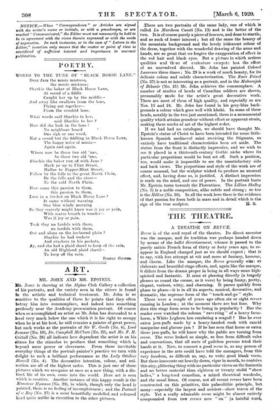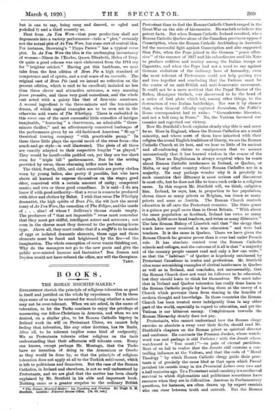THE THEATRE.
A TREATISE ON REVUE.
Revue is of the seed royal of the theatre. Its direct ancestor was the masque, and its tradition was perhaps handed down by means of the ballet divertissement, whence it passed to the purely satiric French form of thirty or forty years ago, to re- appear in England changed just as we should expect ; that is to say, with less attempt at wit and more at fantasy, humour, and charm. Like the masque, the Revue generally aim3 at elaborate and beautiful stage effects, and, again like the masque, it differs from the drama proper in being in all ways more high- spirited and fantastic. It aims at pleasing directly (a tragedy pleases us round the corner, as it were) by being funny, pretty, elegant, various, witty, and charming. It passes quickly from phase to phase—it is in all its aspects, musical, decorative, and dramatic, the supreme form of the " touch-and-go " style.
There were a couple of years ago often six or eight revues running in London ; at the moment there are but four. Why does this stage form seem to be losing in popularity ? Has the reader ever watched the solemn " cavcrting " of a heavy farm- horse, a White Leghorn hen emulating a seagull ? Has he ever eaten jam-puffs made by a heavy-handed cook with rancid margarine and glucose jam ? If he has seen that horse or eaten those jam-puffs, he will know why the public are turning from revue. The revue looked so simple, so free from difficult rules and conventions, that all sorts of guileless persons tried their hands at it. Now, to concoct a good revue is, as any person of experience in the arts could have told the managers, from this very freedom, as difficult as, say, to write good blank verse. But these innocents sat heavily down, cigar in mouth, to contrive this airy, glittering thing with no particular views on the fantastio and no better material than eighteen or twenty stolid " show ladies," a long-toed comedian, a mixed theatrical wardrobe, and the usual limes. Of course, not all recent revues have been constructed on this primitive, this palaeolithic principle, but many—especially the largest and noisiest—show traces of the style. Yet a really admirable revue might be almost entirely compounded from two revues now " on " (a hateful word,
but is one to say, being sung and danced, or ogled and yodelled ?) and a third recently so.
First from As You Were—that your production shall not degenerate into a variety performance—take a " plot," certainly not the actual plot of As-You Were, but some sort of central idea. For instance, Browning's " Pippa Passes " has a typical revue plot. In As You Were the idea is the unchanging inconstancy of woman—Ninon de 1'Enclos, Queen Elizabeth, Helen of Troy. Or quite a good scheme was once elaborated from the 1914 cry for " brighter cricket." Having got this backbone, we next take from the first edition of Bran Pie a high standard of competence and of spirits, and a real sense of an ensemble. The original cast of Bran Pie (and we intend no reflection on the present edition, which is said to be excellent) included no less than three clever and attractive actresses, a very amusing jeune premiere, and three very good. comedians, and the whole cant acted with a gaiety like that of first-rate amateurs. A second ingredient is the three-minute and the ten-minute drama, of which capital examples are to be seen set in the otherwise arid waste of The Whirligig. There is embedded in this revue one of the most successful little comedies of intrigue imaginable, " featuring " a charwoman, an admirable " three- minute thriller," and an affectionately conceived burlesque of the performance given by an old-fashioned American " fit-up " theatrical touring company " with practicable pump." In these three little plays the special merit of the revue form—the touch-and-go style—is well illustrated. The plots of all three are exactly adapted to their respective lengths " as played." They would be insufferable padded out, yet they are too short even for " triple bill " performances. But for the setting provided by revue, these charming trifles must be lost.
The third, fourth, fifth, and sixth essentials are pretty clothes worn by young ladies, also pretty if possible, but who have above all learned to express themselves on the stage, good decor, conceived with a certain amount of unity; competent music; and two or three good comedians. It is said—I do not know if with good authority—that a revue is soon to be produced with decor and clothes by Bakst. I wish that revue The Whirligig dramatist, the high spirits of Bran Pie, the wit (not the moral tone) of As You Were, the comedian of The Eclipse, and the music of . . . alas ! of whom ? Sullivan's throne stands empty. The producers of " that not impossible " revue must remember that they must get skilful, intelligent actors and actresses ; not even in the chorus must they descend to the performing-horse type. Above all, they must realize that if a &lure is to be made of eggs or isolated dramatic elements, those eggs and those elements must be fused and heightened by the fire—of the imagination. The whole conception of revue wants thinking out. Why do the managers not go to the new poets and give the public new-minted humour and fantastics ? Ben Jonson and Dryden would not have refused the office, nor will the Georgians.
TARN.











































 Previous page
Previous page